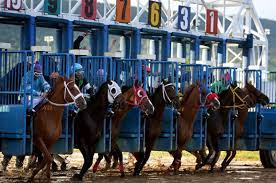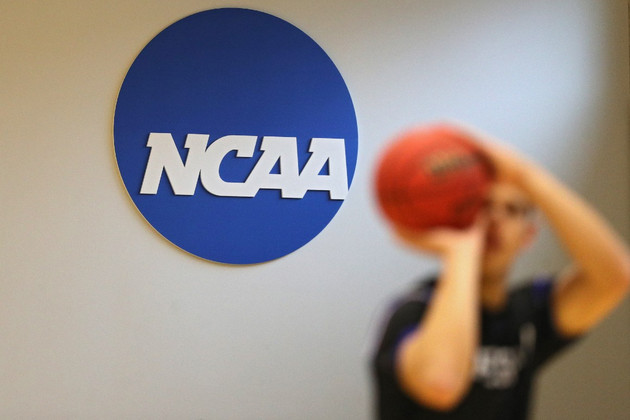뉴스&스피킹(영자신문)
하루 10분이면 영어에 대한 두려움을 극복하고 누구나 유창하게 영어를 구사하실 수 있습니다.
-
 Are You Strong 'Out of the Gate'? And now, Words and Their Stories from VOA Learning English.
Are You Strong 'Out of the Gate'? And now, Words and Their Stories from VOA Learning English.
At the start of this program, we usually share the expression or idiom we are going to talk about. We do this right out of the gate so that listeners know what to expect.
Out of the gate means the very start of something -- like an audio program!
Some people are really good at starting things. Whether it is planning a fun family reunion or a serious work-related project, they are strong right out of the gate. Other people may be slow out of the gate. They take their time getting started, but they may be strong finishers.
So, out of the gate means the very of beginning of something. We can also say at the outset.
Here is an example. As soon as I signed up for an online class, I had trouble with technology. I couldn’t get logged in. I forgot my password. And then my computer crashed. I had so many technical issues right out of the gate! I had problems at the outset or at the very beginning of the class.
This expression comes from sports or activities that involve holding animals behind a gate until it is time to start. With horse racing, dog racing, and bull-riding, the animals all wait behind a gate.
When I was a child, my parents often took me to horse races. The horses were behind a gate as they waited to start the race. As soon as they were out of the gate, the race had started! That’s also when my parents would start yelling. Right out of the gate, they would yell for their horse to win.
In English, we have other similar expressions.
Word experts say that the expression right off the bat is from baseball, cricket, or another sport where a bat is involved.
The batter hits the ball, the ball is in play and the actions of the other players begin. They are, more or less, waiting for that ball to be hit before they have something to do. So, if something happens right off the bat, it happens as soon as something starts.
Another similar expression is from the get-go. When we say from the get-go, we are also talking about the start of something.
Here’s an example using that one. Let’s say you start a new job. It’s important to make a good first impression from the get-go. On your first day, you want to be on time and ready to work. As we like to say, you don’t get a second chance to make a first impression.
And that’s all the time we have for this Words and Their Stories. Until next time ... I’m Anna Matteo.View -
 US College Athletes May Soon Get Paid The National Collegiate Athletic Association (NCAA) and the five biggest college sports conferences recently agreed to pay almost $2.8 billion to settle claims from college athletes.
US College Athletes May Soon Get Paid The National Collegiate Athletic Association (NCAA) and the five biggest college sports conferences recently agreed to pay almost $2.8 billion to settle claims from college athletes.
The NCAA is the organization that runs college sports in the United States. It oversees about 500,000 college athletes from some 1,100 schools.
The claims came up over the past 10 years. The legal files argued that the NCAA and the conferences prevented college athletes from making money while playing sports for the schools.
The agreement calls for the NCAA and the conferences to pay $2.77 billion over 10 years to more than 14,000 former and current college athletes.
The settlement still needs approval from a U.S. federal judge and different parties to the legal case. If it is approved, students who play sports for their colleges will be permitted to be paid, like professional athletes, directly by the schools.
Under current NCAA rules, college athletes, also known as student-athletes, can only receive payments from outside groups that use their names, images, and likenesses in commercial efforts, such as advertisements.
In a statement, NCAA President Charlie Baker and the school representatives said the agreement was “an important step in the continuing reform of college sports.”
Steve Berman, a leading lawyer in the cases, said with the settlement, “college athletes are finally able to receive a fair share of the billions of dollars of revenue that they generate for their schools.”
Ramogi Huma, a strong supporter of college athletes’ rights, played football at the University of California, Los Angeles in the 1990s. He called the decision “groundbreaking”, adding that “there’s no going back from there.”
More questions remain
Although the decision provides a reason for celebration for some current and former students, it leaves more questions for others.
Earlier in 2024, members of Dartmouth College’s basketball team voted to join a labor organization, called a union. The move means that the student-athletes on the team could have the right to negotiate a working contract like other university employees.
Chris Peck is the leader of the union that represents the Dartmouth basketball players. He criticized the decision to settle by calling it “a workaround.”
Peck noted that the agreement, calling for universities to share money from television deals and ticket sales with athletes, does not answer whether students who play sports are school employees. The union wants a clear answer. Are students who play sports employees? Or, are they more like those who participate in non-study activities like singing in a group?
Dartmouth has yet to accept the students’ union vote. And the NCAA is asking the U.S. Congress to step in and say student-athletes are not employees.
Tim Walton coaches the women’s softball team at the University of Florida. The school belongs to one of the large conferences that will have to pay millions of dollars into the settlement.
Walton wants to know what will happen to sports like women’s softball that do not bring in money like men’s football or basketball. He asked: “Are they dropping programs? Are they dropping sports?”
In addition, there is a law in the U.S. known as Title IX that requires women and men to have equal rights in education. Does the law require female student-athletes to get paid like men?
Michael LeRoy is a sports law professor at the University of Illinois. He said there will be a concern if “women get short-changed.”
Christina Stylianou is a sports lawyer in New York. She and LeRoy both said regular payments from universities to students will make it easier for the students to argue that they are indeed employees.
LeRoy said the NCAA would like to be able to pay student-athletes but not consider them employees. That, he noted, would mean the NCAA “is going to be treated differently than any other business in America. You cannot have separate pay.”
But one college softball player, Tiare Jennings of the University of Oklahoma, did not seem too concerned about the legal questions. She was celebrating the fact that she might have some money saved after college.
She said it will be nice for players to know they have money to, in her words, “kick-start your life.”
I’m Dan Friedell. And I'm Jill Robbins.View -
 Special Kind of Fisherman Finds Lost Money James Kane of New York City is a fisherman. But he does not eat what he catches.
Special Kind of Fisherman Finds Lost Money James Kane of New York City is a fisherman. But he does not eat what he catches.
Instead of catching fish, he uses powerful magnets attached to long ropes to “fish” for junk in the city’s lakes, rivers and ponds.
Sometimes he pulls out trash, like old car parts.
But recently, Kane said he found a heavy metal box called a safe. People use safes to store valuable items such as money, gold coins, jewelry or important documents. A safe has a door that swings open and can be locked.
Last Friday, Kane and his girlfriend, Barbi Agostini, were magnet fishing in a lake in the Queens area of New York City. They pulled out the safe, opened it and found soaking wet bags of $100 bills.
They recorded their catch on video.
“Oh, that’s money,” Kane said in the video of the discovery. “Oh, it is! Stacks of bills, dude!”
“Oh, my God!” Agostini says.
The pair said they found almost $100,000 in hundred-dollar bills. However, many of the bills had decomposed and some were stuck together. It is not clear how many of the bills can be recovered and used again.
Many of the bills showed recent markings - Kane said he plans to bring the found money to the Bureau of Printing and Engraving in Washington, D.C. to redeem it.
When Kane and Agostini found the money, they called the police to investigate. According to a police statement, the money was not connected to a crime, so the couple is permitted to keep it. But the police warned the money was in very bad condition.
“I guess you call it a finders keepers thing,” Kane said.
Kane and Agostini record their fishing outings and put the results on social media services such as YouTube.
They have found bicycles, guns, jewelry and even a war weapon known as a grenade. They often find themselves calling police. Some videos show police taking possession of the dangerous objects. One showed them giving police a safe filled with credit cards.
Magnet fishers work all over the country. They find things many others do not because they use very powerful magnets and ropes. These things let them reach parts of water far away from land. One magnet fisher found a human skull attached to an exercise weight in New Orleans, Louisiana. Another, in Georgia, found a gun and the belongings of two people who were killed nine years ago.
Many people see the popularity of the magnet fishers on YouTube and wonder if the videos are real. In comments, they wonder if the finds are staged, or placed in the water ahead of time to make for a good video.
Kane said he may just be lucky.
“I have seen and worked with other magnet fishers that can hit a spot for three months, and I’ll come along and throw the same magnet and get and find something that they’ve been trying to get the entire time,” he said. “I personally can’t explain that.”
Kane and Agostini have ideas for how to spend their $100,000. They plan to buy a new vehicle and more equipment so they can make better videos of their magnet fishing adventures.
I’m Dan Friedell.View -
 Set ‘No-buy’ Rules to Save Money, Cut Waste Some Americans have been setting their own “no-buy” rules in an attempt to reduce wasteful spending and save money.
Set ‘No-buy’ Rules to Save Money, Cut Waste Some Americans have been setting their own “no-buy” rules in an attempt to reduce wasteful spending and save money.
Creating no-buy rules themselves can be easy. People simply make a list of non-essential things they plan not to buy for a specific period of time. The idea has caught attention on social media, with people and groups sharing progress on their goals.
But keeping such rules can be difficult, especially for extended periods of time.
Reporters from The Associated Press (AP) spoke to some people who have set their own no-buy rules, as well as experts. Here are some of their ideas on how to come up with a list of rules, as well as ways to keep no-spend promises.
Identify your weaknesses
Whether it is beauty products, ordering takeout food or buying unnecessary low-cost items at the store, experts suggest knowing your weaknesses so you can make realistic plans.
Mia Westrap is a Ph.D. student in Southhampton, Britain, who decided to establish a no-buy promise, or pledge. But before starting, she took a close look at what she spent money on during the previous few months. Through that process, Westrap realized that unnecessary food and drinks were her big weakness.
“I figured out that I was spending four figures on just carbonated drinks and Pepsi Max,” she said.
Make your own rules
Experts say one of the fun parts of no-buy rules is that there are no set rules. Individuals get to choose what to include and what not to.
Amea Wadsworth is a 22-year-old living in San Diego, California. She told the AP she used to love spending hours looking at clothes and interesting knickknacks at places like Target and Goodwill. But when she moved back home after finishing college, she realized how many things she had built up over the years.
“When I have those decluttering moments and I look through all my stuff, I was finding things that I bought and spent a lot of money on and then never ended up wearing,” Wadsworth said.
To keep her rules, she chose not to buy new clothing and to center most spending only on experiences involving loved ones. Wadsworth also set her rules to be on a month-to-month basis.
Experts say it can be a big help for people to write down their rules to help remember and keep them. However, it is also fine to slightly change some rules, if needed, during the process.
Take a pause
Take a break before buying. When Wadsworth feels a strong desire to get something she sees on social media or at a store, she writes it down instead of immediately buying the item.
At the end of each month, she then goes over the list and decides what, if anything, is worth buying.
Consider unfollowing
Between pop-up offers and influencers praising new products, social media can be a trigger for unnecessary shopping, said Courtney Alev. She is a financial adviser at the company Credit Karma.
If someone feels they are spending too much because of long periods spent on a computer or a device, Alev says they should take a break from any services providing an urge to buy things.
Make changes if needed
As Westrap began her no-buy year, things did not start well. During the first month, her car broke down. Then, she received a costly parking fine.
Experts say unexpected costs or weak moments happen to everyone. So it is ok if people do not end up following their no-buy rules exactly.
Carrie Rattle is the chief executive of financial advisory company Behavioral Cents. She told the AP, “If you fail, you probably need a bit more help. You are not a failure. You have simply failed at one method."
Rattle added that the realization is very important so that people don’t feel “dejected.”
I’m Bryan LynnView -
 Mick Jagger Teases Album, More Touring for Rolling Stones How does it feel for rock star Mick Jagger to be back on tour singing and dancing before thousands at 80 years old?
Mick Jagger Teases Album, More Touring for Rolling Stones How does it feel for rock star Mick Jagger to be back on tour singing and dancing before thousands at 80 years old?
"Like being on stage at 78," the Rolling Stones frontman said one day after performing at a huge show near Boston, Massachusetts.
"It took a couple of shows to get into the groove, but now we're into it," Jagger said. "I'm feeling good."
He first sang the words, “What a drag it is getting old," back in the 1960s. But Jagger is still having fun although the singer turns 81 on July 26. And he does not plan to stop rocking anytime soon.
The Rolling Stones are performing in America in support of the band’s most recent album, Hackney Diamonds. The group will consider touring in other countries next year, Jagger said in an interview.
"We'll consider those offers, where we're going to go and where it will be fun," he said. "It could be Europe, could be South America, could be anywhere."
Jagger also said the Stones are likely to release more new music soon.
Hackney Diamonds was released last October. It was the first new material from the British rockers in 18 years. The album received wide critical praise.
At each show, Jagger commands the stage for two hours with bandmates Keith Richards, 80, and Ronnie Wood, 77. Fans say Jagger still provides a highly energetic performance.
A New York Times review of a recent show in New Jersey said Jagger’s energy seemed to grow greater as the night grew late.
Where does he find such energy?
"I just enjoy it," Jagger said. "Really, that's the answer. I just love doing it.
"You get this back and forth with the audience. You can see they're having a good time, you're having a good time, and it gives you a lot more energy."
Music legends may join Jagger
Jagger said dancing and gym workouts each week help keep him in good physical condition. His father was a physical education teacher and Jagger has often credited his good health to genetics.
On the tour, the Stones play about four songs from Hackney Diamonds in between the band’s older hits. The list changes for every performance.
Coming up, Jagger said, he hopes some of the artists who made guest appearances on Hackney Diamonds will join him on stage. They include Paul McCartney, Lady Gaga, Stevie Wonder and Elton John.
The Stones recorded many songs while making Hackney Diamonds but not all of them were put on the album, Jagger said.
"We've got a lot more, so I think we may be set up to make another album quite soon," he said.
Jagger stays busy outside of the music world also. He is currently producing two films.
Interest in U.S. elections
On the tour, the band asks ticket holders at each stop to vote online for one song they want included in that night's show. Boston fans chose Emotional Rescue from 1980.
In Boston, Jagger urged the crowd to vote in the American presidential election in November.
He did not say which candidate he favored.
Jagger has made brief political jabs on stage and is sometimes criticized as a British citizen commenting on American politics.
"First of all, I think everyone has a right to have an opinion," Jagger said. "It's a free country."
"I feel like it's such an important election," he added.
"I've got seven children who are U.S. citizens. I care about what happens to their future. And I pay a lot of American taxes. So why shouldn't I be able to say what I feel?"
I’m Caty Weaver.View

